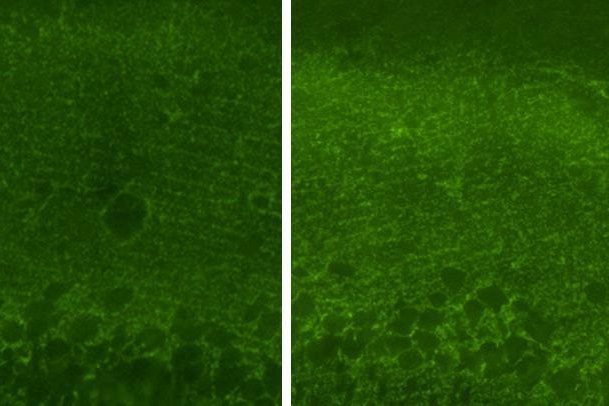After treatment with riluzole, the brains of old rats showed more of a transporter molecule that removes excess glutamate, green fluorescence pictured on the right, as compared to untreated rats, pictured at left. Photo by Harold and Margaret Milliken Hatch Laboratory of Neuroendocrinology/Rockefeller University
NEW YORK, May 3 (UPI) -- A drug used to treat amyotrophic lateral sclerosis, also known as Lou Gehrig's Disease, may also reverse the genetic changes causing the decline's of Alzheimer's disease, researchers report in a recent study.
Researchers at Rockefeller University found the drug riluzole, sold as Rilutek, modified genetic activity in aged rats linked to the degenerative cognitive disease, adding to potential it had already shown with Alzheimer's patients.
The progression of Alzheimer's is linked to a build-up in the brain of glutamate, which contributes to the damaging or killing of neurons.
Although previous research had already shown riluzole caused structural changes in rat brains preventing memory loss, the researchers wanted to see the effects of the drug on glutamate in older rats to understand how it was operating.
For the study, published in the journal Molecular Psychiatry, researchers treated old rats with the drug, finding it modified the expression of the gene EAAT2, which is linked to Alzheimer's disease and removing excess glutamate from nerve fibers.
As animals age, less of this gene is expressed. In rats receiving riluzole, the activity of EAAT2 was comparable to that of a much younger rat.
"The essence is we used a drug known to modulate glutamate, and when we gave it to old rats, we saw it reversed many of the changes that begin in middle age in the hippocampus," Dr. Jason Gray, a researcher at Rockefeller University, said in a press release. "We saw a similar pattern when we compared the riluzole-induced changes to data from Alzheimer's patients -- in a number of key pathways in the hippocampus, the drug produced an effect opposing that of the disease."
Already FDA-approved for use with ALS patients, the researchers are already conducting a clinical trial to test the drug's effect on the brains of patients with Alzheimer's disease.















